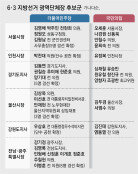[Editorial] South Korea Is Under Crisis
[Editorial] South Korea Is Under Crisis
Posted September. 12, 2004 22:05,
According to a survey conducted by Dong-A Ilbo, Two-thirds of the nation sees the current time as a crisis. This result does not shock us at all, because it is natural people would hardly feel comfortable under a regime that is governing its people in opposition to what the people want. The current government has not even been successful in meeting peoples humble demand of stopping ideological bickering and making all-out efforts to tackle practical issue for peoples livelihood.
When it comes to the National Security Law, over half of people surveyed preferred amendment to abolition, suggesting that while people admit the evil influence of the law, they also consider it necessary. In practical perspective, this is a proper answer. The current government that has been condemning those who object to the abolition of the National Security Law as culprits who hamper the principle of democracy, while lauding the government itself as a spearheading figure who can meet the call of history, must read the nations will correctly.
In regard to the relocation of the capital, 67.8 percent of the surveyed answered, As peoples livelihood is degenerated to extreme levels, the relocation is not an issue we have to implement promptly. And, in an item questioning the propriety of reexamining past history marred by ideological confrontation, 52.6% of the surveyed answered, This is nothing but a provocation of dormant ideological friction. Meanwhile, nine out of ten identified economic recovery as a policy that the president must focus on during the rest of his term. This is the real will of the nation. What the nation wants most deserves to be prioritized when the government decides national policies. If the government does not so, it either fails to understand the peoples will correctly or it sees the circumstances only from its own perspective.
The reaction of the ruling Uri Party to a statement on current issues recently declared by senior members of society is the best example. Responding to advice that asked them to build a strong national identity and, rather than dealing with past history and ideological issues, place the highest priority on economic recovery and the improvement of peoples livelihood, the Uri Party cynically said, The statement is anachronistic, and, This is what they always say. Such an attitude is hardly acceptable. Even though they hold different views, the Uri Party should open their ears, especially when other views are consistent with the nations will.
We call the current government a participatory government. Participation is an aggressive means of direct democracy. The government should respect peoples intentions and consider their opinions as extensively as possible. If the government under the slogan of participatory government ignores peoples intentions and plays down their opinion as a trick to block the opposite power, we can no longer call it a participatory government. Furthermore, if it is incapable of reflecting on its responsibility for making the nation became hostile to its government, the participatory government is not different from past authoritarian regimes.



![[단독]주한미군 무기 중동 차출 협의…핵심 ‘에이태큼스’ 거론](https://dimg.donga.com/c/138/175/90/1/wps/NEWS/IMAGE/2026/03/05/133466662.1.jpg)

![[김순덕 칼럼]‘삼권장악 대통령’으로 역사에 기록될 텐가](https://dimg.donga.com/c/138/175/90/1/wps/NEWS/IMAGE/2026/03/04/133466302.1.jpg)

